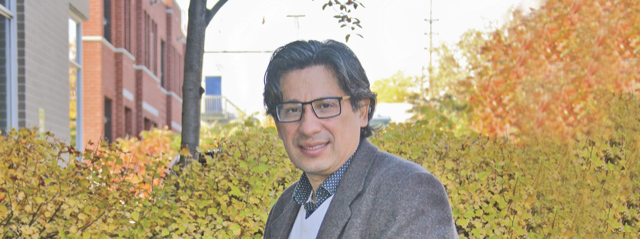
Carlos Zambrano Escamilla is the former president of the Sindicato de Profesores de la Fundación Universidad Autónoma de Colombia (SINPROFUAC) — the teachers’ union at the Autonomous University of Colombia. As Dr. Zambrano explained to CAUT Council delegates last May, he received death threats from paramilitary groups in Colombia and was the victim of an attempt on his life because of his trade union activities. He has applied for refugee status and remains in Canada while he waits for his hearing.
What was your life like before you became a professor at the Autonomous University of Colombia?
I studied forestry engineering in Colombia and environmental economics at the University of Maryland. I was apolitical then, approaching my field in a strictly technical way. That changed in 2002 after I led a sustainable forestry project in Colombia and began to witness the social and political issues facing the communities and people involved with the project. I realized I had a responsibility to help and began getting politically involved.
Your involvement earned you enemies. How was your life disrupted?
I had been organizing local farmers and teaching them about sustainable farm management so as to mix forestry with pasture practices, and increase people’s self-sufficiency. Meanwhile, members of the bloodthirsty Botalon paramilitary were carrying out illegal activities in the area, including generating income through extortion, illegal exploitation of natural forests and by stealing gas from national pipelines. They began accusing and harassing us, and demanding payment in exchange for “protection.” Their tactics escalated until in 2005, their leader threatened my life. My wife, who was pregnant, was also threatened, and at the urging of community members, we fled to Venezuela.
You returned to Colombia. Why?
In 2007 I began to believe that the government of the time would change, and that we could safely return. A process of demobilization and disarmament of the paramilitary groups began, so early in 2008, we returned to our country to resume our lives. In 2009, I began to work at the Autonomous University as a lecturer in environmental and history economics, and joined the teachers' union. I worked my way up through the union organization until becoming president of SINPROFUAC in 2017.
As head of the union, what issues did you observe at the university?
Tuition was very high for students, yet salaries were very low, and sometimes not paid for months, along with suspension of other benefits. Teachers were unjustly dismissed, and these conditions continue due to administrative mismanagement and exploitation. Faculty have been on strike there since last May, after we made many attempts to lodge complaints with a variety of authorities, along with gathering petition signatures and running peaceful protest marches, and garnering media coverage of the situation.
According to the International Trade Union Confederation, over 500 trade union and human rights defenders have been assassinated by Colombian paramilitary groups in the past year alone. Were you threatened again?
Unfortunately, I did receive new threats. In 2018, a letter from the paramilitary group Águilas Negras containing death threats directed at three colleagues and me was delivered to the university president. We reported it but received no response from authorities, and then I also noticed I was being followed. I was threatened at gun point by two members of the Águilas Negras, and again, though I reported this and asked for help, no action was taken by authorities. Finally, last March I was attacked by two men with a knife, and escaped because I yelled for help. People around me on the street came to my rescue and apprehended my assailants. They delivered the two to police, who released them with no charges.
How is your life in Canada so far?
My claim for refugee status is proceeding. My life here is very calm compared to life in Colombia, and comfortable. I must thank CAUT and the Canadian Association of Labour Lawyers who are helping to support me.
__________________________________
CAUT is appealing to academic staff associations and their members to donate to the CAUT Refugee Foundation to support Dr. Zambrano’s resettlement efforts. The Foundation, established in the 1970s, is a registered charity with the Canada Revenue Agency, allowing it to issue tax receipts. All donations received will be used to assist Dr. Zambrano with his basic living expenses as he awaits his refugee hearing. Cheques can be made to the order of the CAUT Refugee Foundation and sent to:
CAUT Refugee Foundation
2705 Queensview Drive
Ottawa, Ontario
K2B 8K2